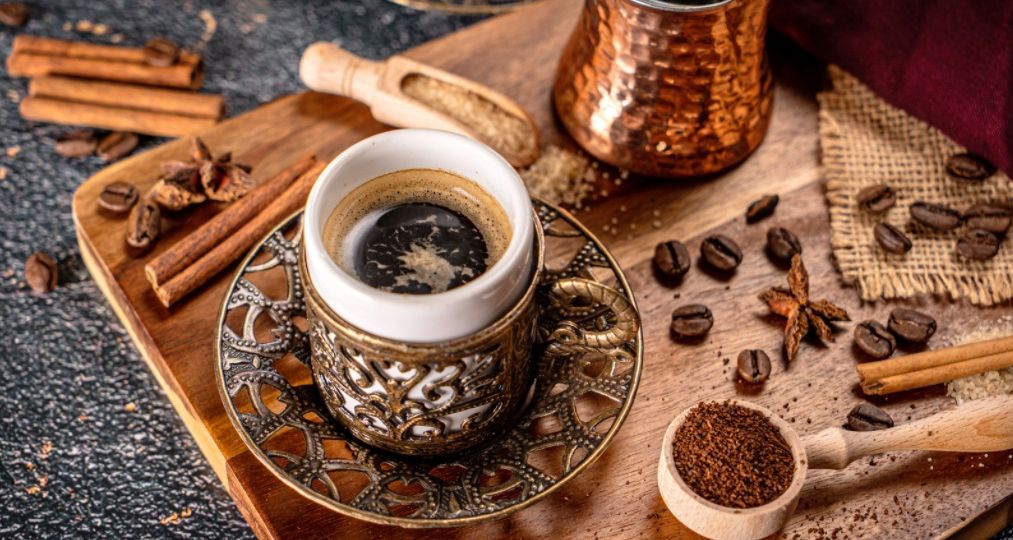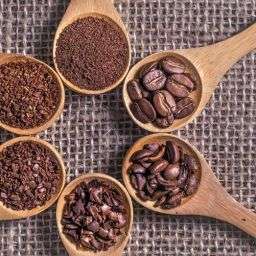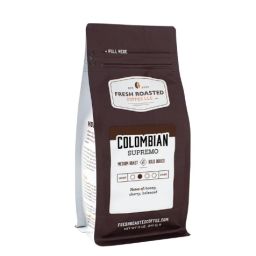
Imagine sipping a coffee that awakens your senses with its bold intensity. Turkish coffee is not just a drink; it’s an experience. Its thick, rich texture and robust flavor fill the mouth, while its aromatic spices linger, inviting you to take another sip. This coffee is traditionally made in a cezve, a special pot that finely grinds the beans to a powdery consistency and slowly brews them to perfection.
More than just a caffeine fix, Turkish coffee holds a cherished place in cultural rituals, often serving as a centerpiece in gatherings and a bridge to meaningful conversations.
Key Takeaways
- Robust Flavor: Turkish coffee is celebrated for its intense and full-bodied taste, far stronger and more flavorful than regular coffee.
- Sensory Experience: It is traditionally accompanied by water to cleanse the palate and something sweet, like Turkish delight, to complement its deep flavors.
- Unique Texture: A distinctive foam layer called ‘kaimaki’ tops this coffee, adding a creamy texture that contrasts with its rich liquid.
- Spice Infusion: Spices like cardamom play a crucial role, adding a complex flavor profile that makes each sip a delightful mystery.
Ingredients and Preparation
When making Turkish coffee, the choice of beans is paramount—Arabica beans are preferred for their superior flavor and lower acidity. These beans are ground into a fine dust, much finer than what is used for espresso, ensuring that the full flavor is extracted during the brewing process. The coffee is then brewed in a cezve, a traditional pot, where water and finely ground coffee are brought to a boil together.
Spices such as cardamom are often added right in the pot, infusing the brew with their aromatic flavors. This method creates a coffee that is not only potent and rich but also steeped in tradition, making each cup a taste of history.
Taste Profile
Turkish coffee is a tapestry of flavors that paints a picture of its rich heritage with every sip. It starts with an earthy base that resonates deeply, setting the stage for the complex interplay of nutty overtones and subtle hints of chocolate. As the warmth spreads, notes of spices like cardamom, cinnamon, and sometimes a hint of clove weave through, adding a spicy zest that tickles the palate. These flavors are so intertwined that each sip brings a new note to the forefront.
The texture of Turkish coffee is as memorable as its taste. The coffee is known for its thick, velvety foam known as ‘kaimaki’. This foam is not just a visual treat but also adds a creamy, smooth texture that contrasts beautifully with the gritty undercurrent of the finely ground coffee that settles at the bottom. This unfiltered nature makes Turkish coffee strikingly bold and thick, leaving a lasting impression long after the cup is finished.
Cultural and Social Aspects
In Turkey and across various parts of the Middle East, Turkish coffee is much more than a beverage—it’s a cultural icon. It plays a pivotal role in social settings, often serving as a gesture of hospitality and a symbol of friendship and respect. Offering a cup of Turkish coffee to guests is deeply ingrained in the social fabric, reflecting a sense of community and tradition.
This coffee is typically served with water, which is intended to cleanse the palate before enjoying the coffee, ensuring that the rich flavors can be fully appreciated. Traditionally, the oldest or most respected guest is served first, a sign of honor and respect in the host’s home. These customs enrich the coffee experience, turning a simple drink into an act of communal bonding and cultural expression. Every cup tells a story, not just of flavors and aromas, but of centuries-old traditions that continue to thrive in Turkish society today.
Health Aspects
Turkish coffee, known for its strong brew, contains caffeine levels comparable to standard espresso, though this can vary based on how it’s made. Like other forms of coffee, it offers potential health benefits, including improved mental alertness and reduced risk of certain diseases due to its antioxidants.
However, due to its potent nature and unfiltered preparation, it also contains cafestol and kahweol, compounds that can raise cholesterol levels if consumed in high quantities. Moderation is key, as with any caffeinated beverage, to enjoy its benefits without risking health downsides.
FAQs
How do you make Turkish coffee at home? To make Turkish coffee, use finely ground Arabica beans and combine them with water in a cezve (a small traditional pot). Add sugar if desired before heating. Boil the mixture on low heat until foam forms, then serve immediately, allowing the grounds to settle.
What are the best beans for Turkish coffee? Arabica beans are most commonly used for their rich flavor and lower acidity. Choose a medium to dark roast to enhance the coffee’s inherent boldness.
How should you store Turkish coffee? Store Turkish coffee in an airtight container in a cool, dark place to preserve its freshness. Avoid refrigeration as it can introduce moisture and odors.
Is Turkish coffee sweet or bitter? Turkish coffee can be both sweet and bitter; it depends on personal preference. Sugar can be added during the brewing process, but the coffee itself typically has a strong, slightly bitter flavor due to the high extraction of coffee compounds.
Final Thoughts
Turkish coffee is much more than a simple beverage; it’s a rich tapestry of culture woven into the fabric of daily life. With its robust flavors, thick texture, and creamy foam, it offers a unique coffee experience that also acts as a bridge to centuries-old traditions. Whether enjoyed alone or shared among friends, it symbolizes hospitality and connection. I encourage you to try making Turkish coffee yourself to fully appreciate its intricate flavors and the rituals that make it so special.









